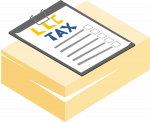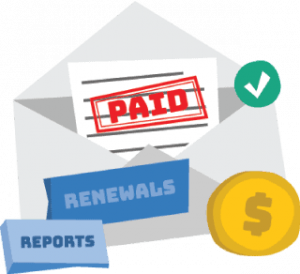Connecticut LLC Taxes
By default, Connecticut LLCs are taxed as pass-through entities. LLCs don't pay federal taxes directly—instead, an LLC's income passes through the business to LLC members. LLC members must pay personal income tax on their earnings at the federal self-employment tax rate of 15.3% (12.4% for social security and 2.9% for Medicare). The state of Connecticut also collects personal income tax and sales tax, and LLCs filing as partnerships or S-Corps must pay a Pass-Through Entity tax. In addition, your LLC may need to pay local or industry-based taxes.
In this article, we’ll cover:


How Are Connecticut LLCs Taxed?
Like a sole proprietorship, a single-member LLC (SMLLC) is taxed as a disregarded entity by default. A multi-member LLC, on the other hand, is taxed as a partnership by default. You’ll pay personal income tax based on your income bracket as well as the 15.3% self-employment tax on earnings from your LLC. Using default filing status, here are the federal tax forms you’ll need to file:
- Single-member LLC—Form 1040 (usually Schedule C, but some SMLLCs file C-EZ, E, or F)
- Multi-member LLC—Form 1065
You can also choose to have your Connecticut LLC taxed as an S-Corp or a C-Corp, which means that you’ll have different tax filing requirements.
Connecticut LLCs taxed as S-Corp
If your LLC will benefit from filing under S-Corp tax status, you can submit Form 2553 to the IRS to change your tax election. Like LLCs, S-Corps are taxed as pass-through entities by default. S-Corps don’t have to pay corporate income tax—S-Corp owners are taxed on the distributions they receive from the S-Corp. However, S-Corp owners are not subject to the 15.3% federal self-employment tax on distributions.
To apply for S-Corp status, your LLC will need to meet the IRS requirements for S-Corps. We also suggest consulting a CPA to find out if electing S-Corp status is advantageous for your business. Filing your taxes as an S-Corp is more complicated than filing under your default status and doesn’t always save your LLC money.
To file as an S-Corp with the IRS, use Form 1120-S.
LLCs taxed as C-Corp
You can decide to have your LLC taxed as a C-Corp, the default status for corporations. This election is less popular for LLCs than S-Corp status but can offer some perks. LLCs filing as C-Corps are eligible for larger tax deductions and can be viewed as more attractive to investors. When filing as a C-Corp, your LLC will need to pay the 21% federal corporate income tax rate along with the 7.5% Connecticut corporate tax rate. Consult a CPA before changing your LLC’s tax status to ensure that filing as a C-Corp will truly benefit your LLC.
Use Form 1120 to file under C-Corp status with the IRS.

Connecticut State Income Tax
If you’re filing under partnership or S-Corp status as an LLC in Connecticut, you’ll need to pay personal state income tax and your LLC will need to pay the state’s Pass-Through Entity (PE) tax.
Connecticut collects personal income tax at a high rate compared to other states. Personal income tax rates vary by income level and filing status. When filing, you’ll pay a flat amount plus the individual income tax rate on any excess over the lowest dollar amount in your tax bracket. To calculate your taxes, you can use the Connecticut Department of Revenue Service’s myconneCT Income Tax Calculator or the most recent Tax Calculation Schedule.
Here’s an overview of personal income tax rates:
|
Taxable Income, Filing Separate |
Taxable Income, Filing Jointly |
Connecticut Personal Income Tax Rate |
|
$0 – 10,000 |
$0 – $20,000 |
3% |
|
$10,000 – $50,000 |
$20,001 – $100,000 |
5% |
|
$50,001 – $100,000 |
$100,001 – $200,000 |
5.5% |
|
$100,001 – $200,000 |
$200,001 – $400,000 |
6% |
|
$200,001 – $250,000 |
$400,001 – $500,000 |
6.5% |
|
$250,001 – $500,000 |
$500,001 – $1,000,000 |
6.9% |
|
$501,001 or more |
$1,000,001 or more |
6.99% |
Connecticut’s PE Tax rate is a flat 6.99%, and the amount of your LLC’s income that is considered taxable (its tax base) depends on your revenue sources.
If your LLC is filing under C-Corp status, your business will need to pay Connecticut’s corporate income tax, which is levied at a flat rate of 7.5%.
Visit the Connecticut State Department of Revenue Services to learn more about taxes in Connecticut and the Taxpayer Service Center to pay your business taxes online.

Sales and Use Tax
In Connecticut, the general Sales and Use Tax rate is 6.35%. This rate applies to the retail sale, lease, or rental of most goods, including digital goods.
Special rates apply to certain goods:
- Computer and data processing services—1%
- Vessels, vessel motors and trailers, and dyed diesel fuel for marine use—2.99%
- Motor vehicles sold to nonresident members of the armed services stationed in Connecticut—4.5%
- Meals and certain beverages—7.35%
- Motor vehicles over $50,000; jewelry over $5,000; clothing, footwear, luggage, handbags, umbrellas, wallets, or watches over $1,000–7.75%
- Passenger motor vehicle rental for a period of fewer than 30 days—9.35%
To collect sales tax, you’ll need to obtain a Sales and Use Tax permit from the Department of Revenue Services. You can for your permit register using the myconneCT portal.

Local Connecticut Taxes
In Connecticut, there are no local business taxes collected by cities or counties. Still, your LLC may need to pay taxes on property or vehicles—and at high rates. For example, the mill rate for real property in Hartford is 68.95% and 32.46% for motor vehicles. Check with your local municipality to determine the tax requirements and rates that apply to your LLC.

Other Taxes in Connecticut
Depending on your industry and whether or not you have employees, your LLC may need to pay additional taxes in Connecticut.
Connecticut State Employer Taxes
With a few exceptions, Connecticut employers must pay for unemployment and workers’ compensation insurance.
- Unemployment Insurance (UI) Tax—Employers in Connecticut are taxed on the first $15,000 they pay each employee during the calendar year. For new employers, the tax rate is 3%, but tax rates vary from 1.9% to 6.8%. To find out your unemployment tax rate, register with the Connecticut Department of Labor’s ReEmployCT unemployment system.
- Workers’ Compensation—Connecticut law requires all employers with one or more employees to provide workers’ compensation insurance. Rates for workers’ comp insurance vary according to the level of risk associated with the work your employees do and your claims history.
Industry Taxes
Certain industries must pay additional taxes to the Connecticut Department of Revenue Services, including:
- Alcoholic Beverage Tax
- Athletes & Entertainers Tax
- Attorney Occupational Tax
- Cigarette Tax
- Controlling Interest Tax
- Dry Cleaning Establishment Tax
- E-cigarette Tax
- Health Care Center Tax
- Room Occupancy Tax
- Tobacco Products Tax
- For a complete list of industry-related Connecticut taxes, consult the Department of Revenue Services’ Information for Businesses tax list.

Do foreign LLCs in Connecticut need to pay Connecticut taxes?
Yes. As an out-of-state LLC registered to do business in Connecticut as a Connecticut foreign LLC, your business is still required to pay all applicable Connecticut taxes. This includes the PE tax and Sales and Use Tax.





